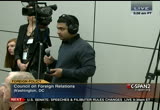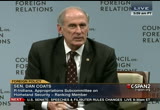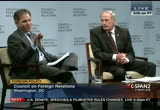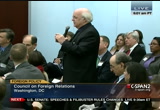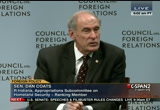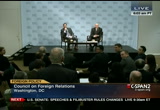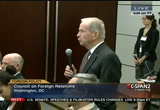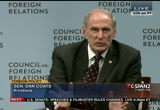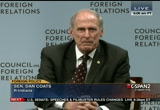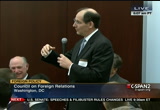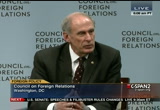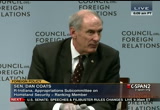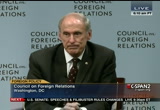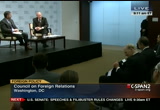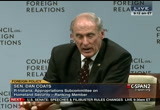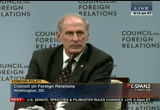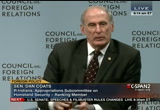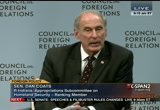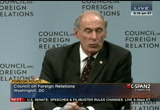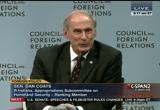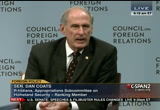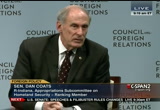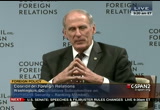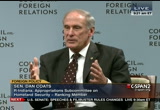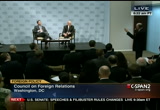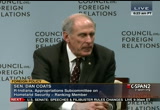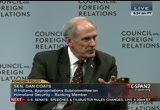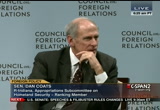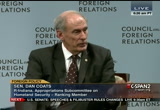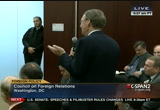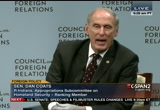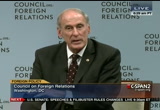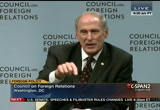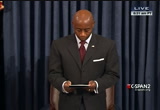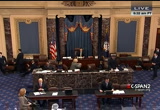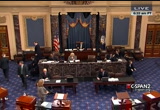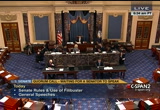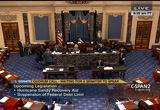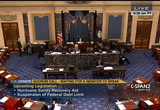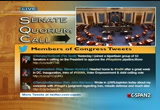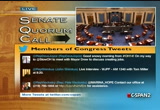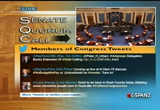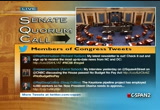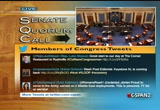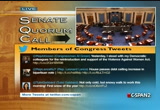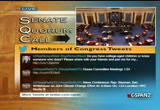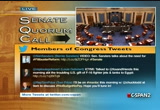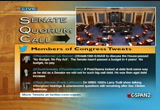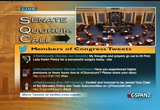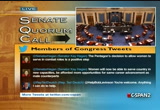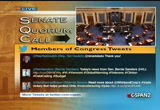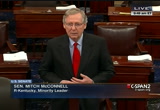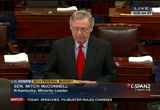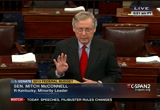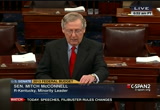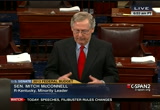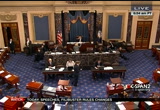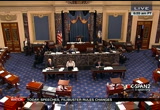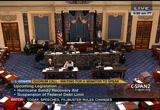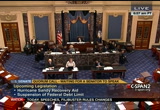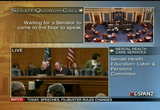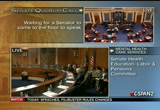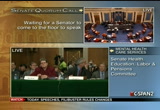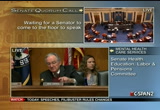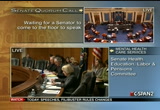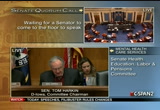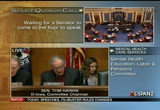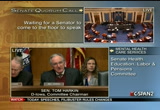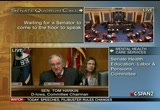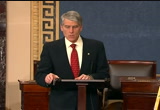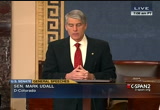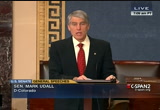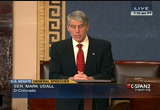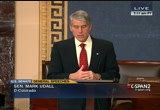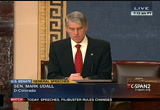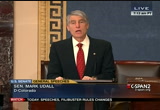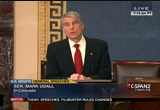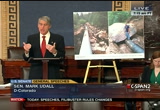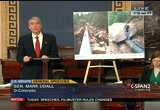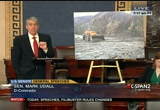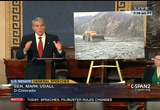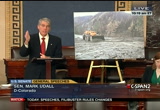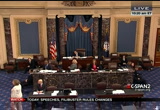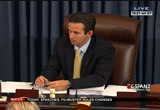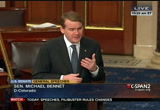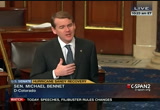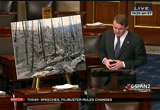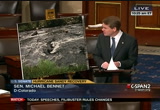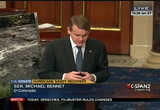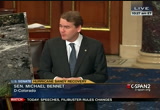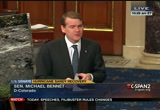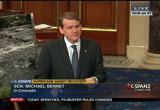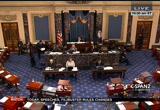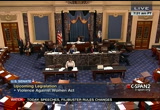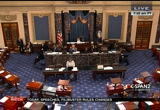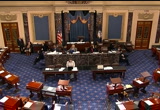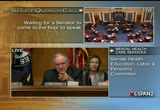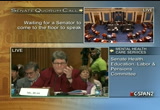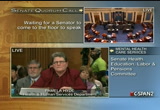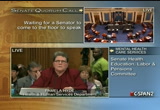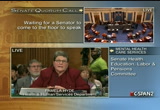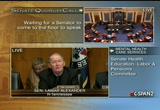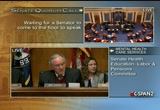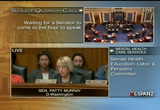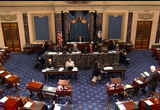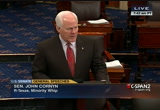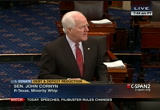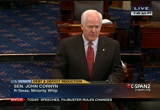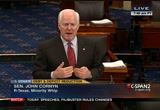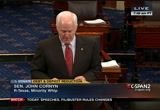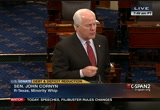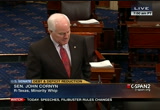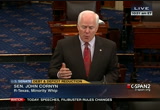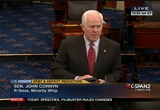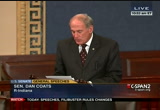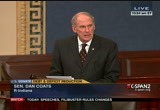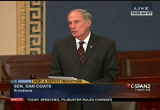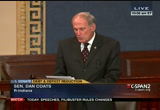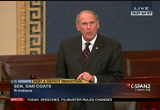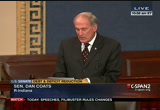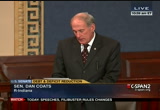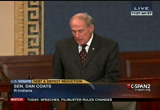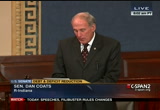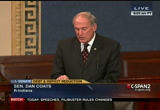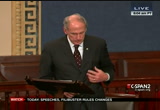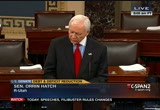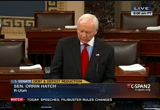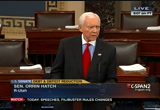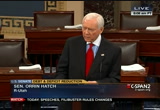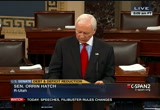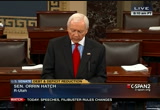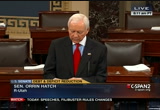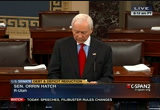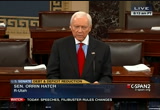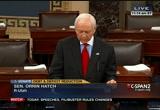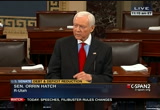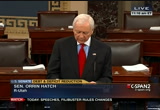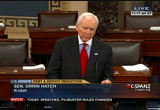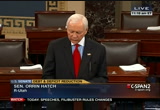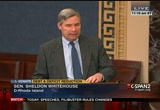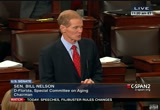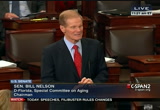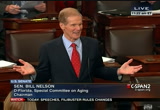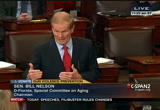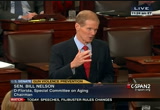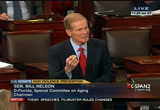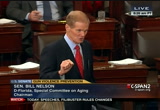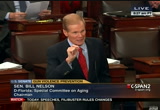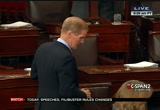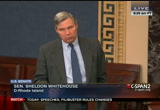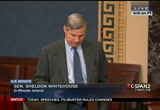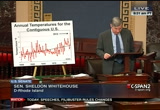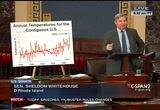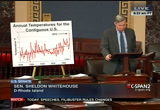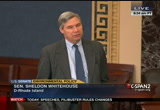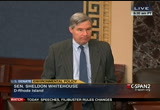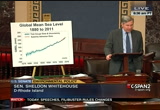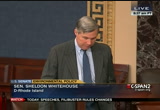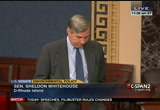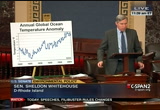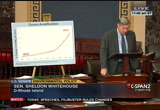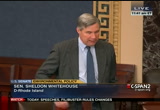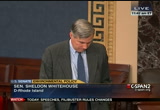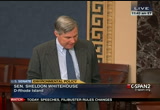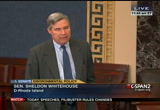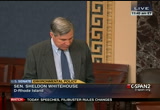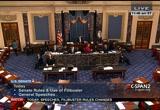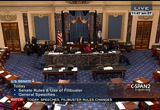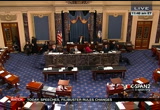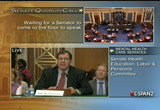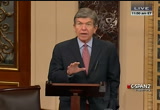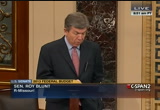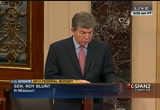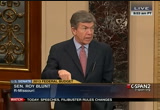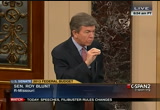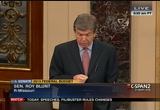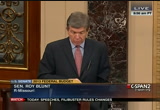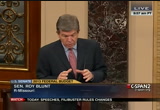tv U.S. Senate CSPAN January 24, 2013 9:00am-12:00pm EST
9:00 am
deliberately -- in 2014? >> we have seen decisions made relative to our presence in afghanistan going forward. i don't currently serve in a foreign relations committee and certainly not as up to speed as other people in this room relative to the assessment of what that might be. we get conflicting reports relative to how successful the government in afghanistan can be without significant american presence. it is difficult enough in iraq, pretty much inside the perimeter
9:01 am
and along of factions fighting in afghanistan. looks to me about the tenfold magnitude of what could potentially happen with the u.s. reduction in presence. i have always said afghanistan is not just about afghanistan. it is also about pakistan. the picture being painted here is a significantly less presence of u.s. involvement in that region with all the consequences that can come from that. >> we are going to try to bring it around here. i should have said when you do enter your question, ask for the microphone and stand and identify yourself and keep your question short. if we have time we will get back
9:02 am
to you. >> please identify yourself. >> one of the things -- jack james from the american institute of german studies. i want to ask about europe and whether or not you think there's enough support coming from europe to deal with those issues. we just talked about it. germany as you well know, and britain, have been going in and out in afghanistan. there has been criticism about holding back. you mentioned constraints. is it not the case that we have to not only expect that if we can get it, europe will be helpful and we would like to not necessarily have a large premium and can you expect that? you know europe as well as i do and the question is do you expect that that is something we could see more of in the future as we face our own constraints at home? >> constraints in europe even
9:03 am
greater than ours and the public will to engage in fact. that is why a lot of questions here by congress saying why are there 40 some thousand troops there, we have all this infrastructure, why can't we bring those home? how much do they step up when we need them? still looking for the europe umbrella over nato and the u.s. umbrella over nato and the u.s. taking money into nato. there are some in the fighting moments coming read this have to the future of nato and the transatlantic relationship in dealing with this range of issues going all across the south of europe that has a direct effect on them. there's a day of reckoning.
9:04 am
i wish i could be more optimistic on it. we all see what the fiscal constraints are in the austerity being proposed. they are going to have to come to the point with some tough decisions to make because the u.s. is not going to be there at the level land presence and protection that they are used to and have relied on in the past. >> mr. mcfarland. >> our budget legacy -- nice to see you. >> thank you for coming. more than 30 years of service. the energy and natural resources committee, we are continuing to san $400 billion a year overseas to buy oil.
9:05 am
your colleague senator lugar for a long time told us the only way to beat a cartel, sponsored open fuel standard, basically make a competitive market, the move, automobiles, trucks, weather is electricity or methanol or ethanol or whenever to have a market so that like brazil when you drive up to the pump you have a choice and the price goes down. do you think that is a good idea? with your colleague gone now a huge loss to our country. would you be supportive of a competitive way to break the opec cartel?
9:06 am
>> in fracturing that competitive instrument, that is causing that to happen. we had a great fortune of this technology to break through that is going to put this in a completely different position than we have been in the past so i don't think we need -- we have seen the effort to try to develop alternative competitive sources of energy. the problem is they can't be competitive, and particularly because of the new discovery of oil and gas through shale and fracturing, total game changer and is going to put this in a position where we are going to be a country where the lowest competitive, most competitive and lowest price for energy of
9:07 am
anyone, talking about germany, putting themselves in a terrible position, cut a deal at the end of this service, and locked in 20 year supply of gas in russia at a price that is four times the price of what it is in the world markets. at the same time the germans have taken the position of shutting down a nuclear plants, a huge subsidies for wind and solar. the problem is the sun doesn't shine very much in germany and the wind doesn't blow in a lot of places and it is highly subsidized in that competitive. a game changer here is exciting for the future of america. if we can get our fiscal act
9:08 am
together i think we have some bright years ahead of us in terms of returning to economic world leadership, this breakthrough technology is amazing. >> another question? here. >> wonderful staff went on to do great things. >> i am wondering if you could discuss a little from your perspective in the appropriations committee, obviously people figuring out how to pass bills and put a number out there but impacting the policy is going to be far more intricate and difficult to do, as defense expenditures come down specifically whether or not florida policy and those types of appropriation from state department increases change much, load on diplomacy will increase significantly. how do you see congressional
9:09 am
committees collaborating in working with the administration to not only set those budget figures but influence the evolution of policy? >> the first challenge is led the committee be the committee. certainly the appropriations committee is all for naught if we don't have regular orders. it starts with a budget which now we are told we are going to get finally in the senate this year one way or another and starts with the regular process of committees working through the process given whenever cap, it forces us which is what we should have been doing all along, it forces us to make decisions as to what are the essentials functions of government that need to be funded and how do we find the resources to fund them?
9:10 am
how do we separate that from what we can't afford to do right now and how do we separate those from these are no longer viable and haven't proven their words, shouldn't transfer money from your to the essentials? it is that triage process that has not taken place in the past but the budget constraints are forcing us to make those decisions and that is because the pie is shrinking and discretionary and growing mandatory -- that will have a direct effect on policy and how many ships we can build and where we want to be locating our troops, we talk about a specific have that -- pivot, marines on a six months rotational basis in australia and they are going to
9:11 am
be there looking north to china, indonesia, all of the pacific, that is a shift. how are -- how many carriers do we put in the pacific if we are cutting down on the numbers we're going to build, on and on it goes. we have to make some tough decisions on priorities but the toughest decision that hasn't been made and must be made, we're all looking at austerity and doing much less than we need to be doing as the world's leading nation and that is getting control of runaway mandatory spending that is leaving all of us in an austerity position and in the long run really hurts america. right here.
9:12 am
>> senator, you served as ambassador to germany. can you comment on germany's role in the world today? arguably given their financial and economic strength, couldn't you be doing a lot more even in the military, the second world war is 70 years behind us now. could you give us your view on germany's role today? >> there's a myth about this german economic machine. compared to the rest of europe it looks terrific. when you look at the gdp growth, 0.4%, they get to 1%, they call a holiday and celebrate. >> always having holiday. >> a wonderful place to serve because you can sit in the cafe and drink coffee, germans love to talk, we were talking
9:13 am
whatever problem there is let's have some dialogue about that. showed germany isn't in the position that it projects itself to be and i think it has a reputation of obviously producing magnificent machines and cars and the germans do it, they do it right. and weak economies, heavily dependent on exports, heavily dependent on the car industry and that could go up and down. two things. i don't think they have the political will to engage outside the borders and i don't think they have the financial resources to do as much as we thought they should do and even some of their policy people think they should do relative to
9:14 am
their national security, strength, military strength. is always not in a condition to do that and a heavy reliance on u.s. presence as that diminishes, some tough decisions to make as other nations. >> good morning. barbara matthews, international regulatory analytics. i have a question about the 20% written large. you have described what sounds like what you consider to be an inevitable retrenchment if not potential return to some isolation in the united states weather for political reasons or budgetary constraint purposes. that is a different position than the guarantor of security and liberty globally. europe may not have the
9:15 am
financial resources to pick up the baton. can you describe what you think the risks are to the united states in not serving the leading nation physically, militarily, particularly in the context of so much optimism being placed on soft power, trade relationships, trade agreement and economic power, the post-modern way of guaranteeing security? >> the consequences are potentially very significant. america has always been looked to since the end of world war ii as a nation that paved the way, much like we used to look at california as the future for the other 49 states. today we look at california and say it is a basket case. the world is looking at america
9:16 am
today saying they are not the power they once were. they don't have the will or the commitment to be that or the resources to be that. they read the tea leaves more carefully than the american public does when they look at the remarks the president has made relative to our national security and engagement in the future, they look at the congress, they look at our fiscal situation and they say america is not what it once was, and what happens, consequences are it frees up people to do things that are not in our best interest. they don't have the constrained, the threat of american presence and american influence and even engage and to restrain them.
9:17 am
so we are severely underresources in the islamic madrid area of africa trying to make up with it with p 3 intelligence and reconnaissance and surveillance and drones if we can get them there. and yet there's a growing presence of radical muslim extremism growing in that part of the world. so i think the consequences are great. don't want to beat a dead drum but i keep going back to without a dynamic economy we are not going to have the resources to be that nation that the world can look to as the overseer of tensions in a nation you can
9:18 am
turn to to resolve some of those tensions. we haven't talked about iran yet but iran's continued movement toward possession of nuclear capability, weapons capability in the game changer for the whole middle east. get started on proliferation of proliferation of other nations pursuing that. i cannot foresee how saudi arabia, turkey and even egypt can say we are going to let iran be that nuclear power, the leverage they would get, maybe right now, that used to be a high profile -- you don't read much about it anymore but the clock is ticking in tehran towards nuclear capability.
9:19 am
some verbiage over here about more sanctions and diplomacy and so forth but no response the other way from leaders in iran. >> other questions? in the back? >> senator steve chaney with the american security project. please do you talking about weapons of mass destruction but i wanted her about our weapons of mass destruction. the caps at 1550 with thousands more in reserve. is there not an opportunity to look at the triad, but that significant reductions, looking at new s.t.a.r.t. and not build a new submarine or bomber and save a ton of money. >> that will be part of the debate but at some point we have to decide at what level we need to be from a national security military standpoint, to be viable and protect the american
9:20 am
people and to be seen, someone with the capability to do that. i think the larger question is we need to focus on reduction, what is happening around the world, what is happening in north korea, what is happening in iran, what kind of access are some of the terrorist groups going to have to wm d capabilities? that is the greater threat. i give senator lugar credit for being part of reducing -- destroying those weapons and so forth and so on but the real challenge is those who are totally ignoring the non-proliferation treaty, doing
9:21 am
everything they can to move toward that capacity. >> if i could excise the follow-up, we need to prioritize within the national security budget, we need to -- whether it is his or someone else, the sequester seems to be this sort of broad across-the-board cuts. could you give us as specifically as you deem appropriate sense of what that is going to do to the defense budget? >> you have seen what leon panetta has said, you have seen dire warnings in terms of the military across the board, doesn't have any new priorities, gets totally away from the tree on i was talking about. one of the essential things, one of the essential functions, this is the consequence of our
9:22 am
inability to support and set up a system whereby we can make those priorities and it is sort of the worst possible last thing we can do to and for some kind of spending discipline. i did not vote for the budget control act because of the sequestered because it is the wrong way to go forward in terms of that. every other option has been rejected by this administration. even bipartisan efforts. give mark warner great credit for trying to pull together the senate working with the game of 6, working with others. at one point, thirty-eight of us, nineteen democrats and 19 republican senators sent a letter to the president saying mr. president, we will support a grand bargain even though each
9:23 am
of us wouldn't want more of this or less of that, we would support this if you will take the lead and we will give you the cover they need politically underwriting the message by making this a bipartisan effort and it was totally rejected by the white house. we are at the point where we have no other option, of forcing mechanism to address a problem that will bankrupt this country and take down everything if we don't move forward. >> i am retired lawyer in washington. good friend of senators. thank you for coming. the question is about europe and the united states. those two areas have different views about current policy of the israeli government and there
9:24 am
seems to be a lot of stress in that relationship. can you comment about that? >> it is one issue i had to deal with in germany. in the audience, my deputy chief in lane, good friend of several of us, works on my staff. knows a lot more about these questions than i do and which he was up here instead of me. that is a really good question. i don't know -- the relationship between america and george w.
9:25 am
bush was very solid. my mind drifted. your question was the israelis. i am sorry. time for a refill on my coffee. many, many discussions with the germans relative to their position, relative to our position and the israeli issue. public sentiment in germany as a whole is strongly for a reconciliation for the palestinians, yeah overlying all of that is the residue of the holocaust. i think i can say this. i have a private discussion with
9:26 am
the foreign minister on this topic and it had to do with iran and the nuclear threat to israel and the position germany was taking relative to that. i was questioning where they might be should there be a real threat or attack on israel. he said you know that that is not what the public would want us to do but given the holocaust we have no choice but to be there in support of israel. we cannot stand by and let another holocaust take place. so those decades of remorse and
9:27 am
guilt over the holocaust dictates policy relative to support for israel even though the public now decades on says why do we need to do that again? do we want to get mixed up in that? that is a unique dynamic that exists in that regard but it is somewhat of a tenuous relationship. i spend a lot of time with israeli ambassador, german, spent a lot of time with the germans relative to german policy toward israel in a number of ways so anything short of direct threat or attack on israel the consensus is we wish
9:28 am
we could get this resolved and we wish israel would be more flexible to the west bank and relative to -- >> we have time for one more. let it be two more because i promised to follow up. goal ahead. >> this will be a friendly question i suspect. >> tom davis of general dynamics. thank you for being here. you mentioned a couple times in a favorable way the desire to return to regular order in terms of budget processes. norm bernstein and tom mann have put out a couple of them if i were to summarize i would say they are arguing as political scientists that we wound up in this country with a parliamentary political structure without a parliamentary government structure. a lot of commons going back and forth about the need for rule changes, restoration of things that go beyond regular order in a lot of ways.
9:29 am
do you see the possibility congress is going to take a close look at itself and how its own rules are structured so we don't have the gridlock we have seen the last few years? >> i am anxious to get back because it will be probably decided today in terms of what rule changes if any will be attempted to be imposed by harry reid on the minority. we have had hours of discussion about all this. republicans obviously in the minority now desperately trying to preserve the rights that traditionally the minority has had, relative to procedure. the challenge is to try to find that balance which will allow us to get to some semblance of regular order which is -- i first came to the senate, george mitchell was majority leader and
9:30 am
i came from the house. what is the difference between the house and senate? in the house you have a rules committee and you are lucky if your caucus gets one amendment and 30 minutes to talk about it before you vote on it and that is it. the great thing about the senate is any senator can offer any amendment to any bill at any time and that is a wonderful privilege particularly for the minority which i was in at the time. when the republicans had vote majority and could have imposed rule changes to stifle them, even though it would have been to their benefit to do so, every single republican voted against making those rule changes a reserving the privileges of the minority is not only constitutional but it is the way this should function. doesn't result in dysfunction? yes. does it result in all kinds of the lake, yes.
9:31 am
can it be worked through if you do regular order? guess. are for your amendment. if it passes it will be attached to the bill that dealt with in conference. if it doesn't you had your shot. regular order prevents the process of saying we are not going to go forward and prevents the majority leader from simply stealing this tree which nobody understands including senators but prohibiting the minority from having those rights and so we are going to decide how to go forward with that and there will be an answer on that but the goal ought to be from both sides, to make the process work so that ultimately a decision can be made on whether it -- whatever is being proposed and everybody will have their yea or nay out there for their public
9:32 am
to support or disagree with and this -- >> leaving this conversation at this point. seated entirety on c-span.org. live to the u.s. senate floor. senators have just dabbled in for the day. o trust you to help, protect, and guide them. may they learn and depend upon your promises, believing that your blessings will keep america strong. reveal to them your priorities and plans so that they will stay within the circle of your will. lord, make them agents of your visible impact on our nation and world as you guard their hearts
9:33 am
and minds with your peace. we pray in your merciful name. amen. the presiding officer: please join me in reciting the pledge of allegiance to our flag. i pledge allegiance to the flag of the united states of america and to the republic for which it stands, one nation under god, indivisible, with liberty and justice for all. the presiding off icer: the clerk will read a communication to the senate. the clerk: washington d.c., january 24, 2013. to the senate: under the provisions of rule 1, paragraph 3, of the standing rules of the senate, i hereby appoint the honorable brian schatz,
9:34 am
a senator from the state of hawaii, to perform the duties of the chair. signed: patrick j. leahy, president pro tempore. mr. reid: mr. president, following leader remarks, the senate will be in a period of morning business with senators allowed to speak for up to ten minutes each. the majority will control the first 30 minutes, the republicans the final 30 minutes. would the chair announce the business of the day. the presiding officer: under the previous order, the leadership time is reserved. under the previous order, the senate will be in a period of morning business for debate only until 12:00 noon with senators permitted to speak therein for up to ten minutes each, with the majority controlling the first half-hour. the clerk will call the roll. quorum call:
9:50 am
mr. mcconnell: mr. president? the presiding officer: the republican leader. mr. mcconnell: are we in a quorum call? the presiding officer: we are. mr. mcconnell: i ask that further proceedings under the quorum call be dispensed with. the presiding officer: without objection, so ordered. mr. mcconnell: i don't know if anyone you know -- i don't know if you know anyone who has climbed to the top of mount everest, but i'm told it's quite an undertaking. it apparently took sir edmund hillary several weeks to do it back in the 1950's. i'm told that my friends across the aisle could have scaled everest almost 300 times in the
9:51 am
nearly four years that have gone by since they last passed a budget. they could have taken 179 trips to the moon or built three pentagons. today it looks like that's all about to change. it's nice to see that after years of playing budget peekaboo, senate democrats are finally ready to take up their most basic of responsibilities, and only a few weeks after the chairwoman of the budget committee indicated they might skip it for the fourth year in a row, there is an indication now that the majority is committed to passing a budget. what's unfortunate is that it's required so much pressure for them to do so. it's in stark contrast to the house of representatives who have taken their duties very seriously. over there, committee hearings have been held, budget resolutions have been marked up, amendments have been considered. more importantly, the house has
9:52 am
passed serious budgets annually, as the law requires. they have laid out their priorities for the public to see their plans to control spending could save our most important social programs from collapse. to reform an outdated and anticompetitive tax code, and to streamline government bureaucracies that are literally suffering job creation. they have done their jobs while senate democrats have tried to keep their priorities secret. now, we know senate democrats don't like the house budgets, and we know they don't even support the president's budgets, at least not with their votes. what we haven't known for nearly four years is what they're for, because they have refused to put their plans for the country down on paper and actually vote for them. now it's my hope that the democratic sudden interest in
9:53 am
passing a budget isn't just another attempt to actually raise taxes. as i've said repeatedly, we're done with the revenue issue. the president has already said that the so-called rich are now paying their -- quote -- "fair share" -- end quote, and of course middle-class families are already on the hook for new taxes as a result of obamacare. so the question is who would be in the firing line this time? and at what cost? look, struggling families shouldn't have to pick up the tab again for washington's inability to live within its means. we need to start solving the actual problem, which is spending, and we need to do it together. so if -- and i say if democrats are finally ready to confront the massive fiscal and economic challenges facing our country and to do so in a serious way, i assure them that they will find partners on this side of the
9:54 am
aisle. as for the debt limit, there is no need to wait for final resolution of the house's short-term legislation before we start putting a long-term debt reduction solution together here in the senate. if the bill the house passed yesterday is signed into law, congress will have another three months to take the debt challenge, take it on seriously, but that does not mean we should wait a minute longer to start working on it. there's no reason, for instance, that the finance committee shouldn't begin preparing the critical spending reforms that will be necessary, for example, to get my vote, and a vote of many of my colleagues for any kind of long-term inquiries in the debt ceiling. so let's get the process moving. no more brinksmanship, no more last-minute deals. the american people have already had to wait four years, four years for a budget from senate democrats. they shouldn't have to wait nearly as long for us to
9:55 am
confront a debt that threatens the economy, our jobs and the future of our nation. yesterday, i laid out the remedies of the -- the realities of the fiscal challenges we face as a country. we've delayed facing them long enough. let's put the politics aside and finally do the work we were sent here to do. mr. president, i suggest the absence of a quorum. the presiding officer: the clerk will call the roll. quorum call:
10:08 am
the presiding officer: the senator from colorado. mr. udall: mr. president, i'd ask unanimous consent that the quorum call be lifted. the presiding officer: without objection, so ordered. mr. udall: mr. president, i also ask unanimous consent i be recognized to speak for ten minutes as if in morning business. the presiding officer: without objection, so ordered. mr. udall: thank you, mr. president. i rise today to speak in favor of a critical issue for my state, and that is much-needed wildfire relief. i want to be more specific.
10:09 am
colorado has been in dire need of emergency watershed protection funds since fires raged in my state just six months ago. just six months ago we were in the news not only in our country but around the world because of the fires in our state. and this is an important issue, one of the most important issues confronting my state because the last fire season was the worst literally on record. and although the fires no longer burn, the threats that they pose to entire communities persist long after the final embers are extinguished. literally hundreds of thousands of coloradoans remain vulnerable to flooding and tainted water supplies in the aftermath of these fires. to people not from the west, the reason why this is an emergency may not be immediately clear, so let me explain. in my state, the height park and waldo canyon fires -- the two
10:10 am
fires all over the news -- tragically took lives, burned more than 100,000 acres and led to catastrophic property loss. president obama declared them national disasters, and he actually came to colorado, joined me and the rest of the delegation to visit the scenes of destruction where over 300 homes were destroyed in colorado's second largest city. that is colorado springs. the initial impact and those initial scenes could pale in comparison to the threats these communities will face in the coming days, months and years. why is that so, mr. president? well, because once a mountain side is stripped of all its trees and foliage and the soil is burned down to bedrock there is nothing left to hold back the water and debris as it races downhill towards our communities in its path. without rehabilitation and restoration, the watersheds that provide municipal water are at
10:11 am
risk from land side and erosion. in turn that could result in serious infrastructure damage, water supply destruction and even loss of life. stabilizing and protecting these communities' watersheds is simply the right thing to do. moreover -- and this is important -- taking action now is also fiscally responsible. quite simply, if we do not do the repairs now, we will pay more later. so when coloradoans came to senator bennet and me to share these needs confronting our state, we immediately went to work. we delivered on the promise of providing fire relief when the u.s. senate passed the emergency supplemental spending bill in december last year which also provided much-needed relief funds for hurricane sandy victims. that was a bipartisan bill. it was supported by senate republicans and democrats alike. but the republicans in the house regrettably gutted the bill and sent back legislation that
10:12 am
explicitly cut out wildfire relief. in that context, let me make one point absolutely clear. this is an emergency. some people have questioned the need for funding and have asked why we wouldn't limit dollars to just hurricane sandy saer kwras like the bill -- hurricane sandy areas. the short answer is it is the fiscally smart thing to do, the right thing to do, and the fair thing to do. this bill is an emergency appropriations bill for all national disasters, not just hurricane sandy. it is our best hope of seeing wildfire relief. i emphatically note that the colorado emergencies occurred before hurricane sandy and the west should not have to continue to wait. very few emergency supplemental bills pass congress. this bill is passing now, and it should include aid for colorado and other states across our country. we as americans, we're in this all together.
10:13 am
and when deadly disasters strike, we all support each other. i know the presiding officer's home state of hawaii has experienced natural disasters. we stand together when we get into these situations. that's why i'm so frustrated that the u.s. house of representatives dismissed colorado's needs and ruined our chances, the west's chances of immediate wildfire relief when lawmakers there failed to include emergency watershed protection funding for colorado in this disaster relief legislation. mr. president, this neglect, it's particularly disappointing, because if the house had quickly taken up the senate-passed disaster assistance bill at the end of last year, we would not be in this desperate position today. i say this somewhat reluctantly, mr. president. i served in the house for ten years. but i have to say that the u.s. house is setting a dangerous precedent of arbitrarily legislating disaster relief
10:14 am
funds. communities across this country, and not just those affected by hurricane sandy, are at risk of catastrophic flooding and contaminated drinking water. but house republicans are either sending a message that the west doesn't matter or saying they don't care about certain communities once the tv cameras are focused elsewhere. so what's the latest development in this ongoing fight to help wildfire victims? yesterday i introduced an amendment to the house-passed disaster relief legislation that would help national disaster areas repair their drinking water supplies and the symms that back up those -- and the systems that back up those water supplies. this amendment would not add a single cent to the bill and instead simply reverses the house's decision to exclude all states other than those affected by hurricane sandy. no one questions that we need to help hurricane victims in the northeast, but whaoeuld fire --
10:15 am
wildfire relief is not pork. let me say that again. wildfire relief is not pork. colorado's record-setting wildfires in 2012 displaced tens of thousands, destroyed more than 600 homes statewide and tragically resulted in deaths. wildfires destroyed communities and their devastation persists for decades. these restoration projects of which i speak must get started now before our spring snowmelt sends tons of ash and sediment into our water supplies and various homes and infrastructure under mud slides and flood waters. as i said earlier, i know these fires, mr. president, may seem like old news for some, but coloradoans are living under the ongoing threats every day. and i want to remind all my colleagues that in the past the national resources conservation service, the nrcs, have the flexibility to provide e.w.p. assistance for earlier disasters
10:16 am
before moving on to the needs created by subsequent events. and as of december, 2012, an estimated $47 million was needed to mitigate damaged watersheds in the aftermath of other presidentially declared stafford act disaster areas. in arizona, in colorado, in louisiana, florida, minnesota, mississippi, new york, utah and wisconsin, north, south, east and west. and of the $180 million the house approved for sandy-related emergency watershed protection relief, only $30 million has been requested, yet the house bill is saying that other communities cannot have access to these funds to protect their own people. it's senselessly wasteful to leave these other communities behind to suffer the effects of
10:17 am
less recent disasters, whether they faced wildfire, hurricane or flood. mr. president, i'm not being an alarmist. coloradans unfortunately have already experienced some of these effects. for example, the usually clear and crystal clear puta river has been flowing black, literally flowing black due to ash and runoff from the fires. this forced the downstream city of fort collins to shut off their water intake for over 100 days. i know senator bennet was on site just a week ago, and the pictures were tragic and they compel action. further downstream on that important water course, the pu. uter, the city of greeley shut off their water intakes for 36 days and still are only able to take a small fraction of their normal intake. i have got a photo here, mr. president, that shows a water main that supplies 75% of
10:18 am
the backup drinking water supply for the city of colorado springs, our second largest city to the south of denver. this pipeline used to be buried eight-feet deep but it's now exposed to runoff and it's been exposed because of the runoff in the fire area and of course it will be exposed to more runoff. but you can see the effect of what's happened after these fires. how much more of an emergency do we need when our most basic resource, drinking water supplies for three of colorado's largest cities and its families and businesses is threatened? let me share one more example. the flood potential in the burned areas is now 20 times higher than before the fire, which means that areas are experiencing 100-year floods from the aim amount of rainfall that it would have caused a five-year flood before the wildfires. look at this photo here.
10:19 am
this is highway 14, which is a major east-west artery through northern colorado. this mud slide is one of many that occurred during one very minor rainstorm after the hyde park fire. these mud slides on our major roads put people, property and commerce at risk. already families in the colorado springs vicinity, which i have been mentioning earlier, have received at least four flash flood warnings since the waldo canyon fire. the need for stabilizing this ground and restoring the burned areas on both federal and private land is critical to public safety, public health and the prevention of another disaster. so, mr. president, as i begin to close, don't get me wrong. i support the recovery of the communities devastated by hurricane sandy, but i want to ensure that my colleagues here understand the gravity of the situation we're facing in colorado and in other states that are confronting disaster
10:20 am
needs. the senate delivered when it came to providing fire relief in part because of my colleague senator bennet's great work on the agriculture committee, but the house unwisely sent us a package that turns a blind eye to colorado and the west. if we do not act soon, communities across this nation will see unnecessary flood risks, contaminated water supplies and even the potential for tragic deaths looms caused by our inaction. that's simply not acceptable, so when someone asks whether the e.w.p., the emergency watershed protection provisions and program is necessary, critical or even emergency, the answer is emphatically yes. for many of our communities in colorado, this is their number-one priority in congress, and i for one am not going to let their critical needs go unmet. mark my word, this is not an
10:21 am
issue that i am going to let die. it's not an issue that senator bennet will let die. we're going to keep at it until we stabilize these soils, protect our water supplies, stand up for the people of colorado and the people of our country. so, mr. president, i thank you for your attention, and i would request that my statement appear in the appropriate place in the record. the presiding officer: without objection, so ordered. mr. udall: mr. president, i yield the floor.
10:22 am
a senator: mr. president? the presiding officer: the senator from colorado. mr. bennet: thank you, mr. president. i'd like to thank my senior senator from colorado for his remarks and for his commitment to this important issue, and in a moment, i'd like -- i'd ask the chair for unanimous consent to speak for seven minutes on the same topic. the presiding officer: without objection, so ordered. mr. bennet: thank you, mr. president. i would also ask unanimous consent that laura pence, rena shaw and stephanie artoon, all legislative fellows in my office, be granted floor privileges for the remainder of the session. the presiding officer: without objection, so ordered. mr. bennet: thank you, mr. president. mr. president, i rise today to speak briefly about the disaster bill that's in front of the senate and to address an issue of enormous importance to the people of colorado. we have in front of us a disaster bill to respond to the
10:23 am
widespread damage caused by hurricane sandy along the east coast, and we should obviously pass this bill to help our fellow citizens in their time of need. and it's in that exact same spirit that the senate passed a disaster relief bill at the end of last year. we passed a bill that helped victims of natural disasters all across this country, not just the victims of hurricane sandy but also the victims of the devastating wildfires we saw in my home state of colorado and other states across the west. we worked very hard to get that money into the bill that the senate passed in december. with mark udall's leadership, we were able to successfully make the case that colorado has a significant need for resources to help protect communities affected by the wildfires. we worked closely with the senate appropriations committee, and they answered colorado's call for help.
10:24 am
and i want to thank those members, members from both sides of the aisle who supported us. that was a hard thing to do. it was a hard thing to do, but in the end, the idea that we're all in this together prevailed. but the house let that bipartisan bill die at the end of last session, and congress had to start anew. and now here we are, asked to consider a house-passed bill that leaves colorado behind, a bill where the house arbitrarily stripped out the money that would help our struggling communities in colorado. and now we're told that this bill is unamendable. we're told that the house has drawn a line in the sand and won't take any changes. and like my senior senator, i'm stunned by this and profoundly disappointed. so let me tell you what this means for the people of
10:25 am
colorado. the waldo canyon and hyde park fires from the summer of 2012 were the first and second most destructive fires in colorado's history. they tragically resulted in loss of life for several coloradans. the fires destroyed hundreds of homes and caused millions of dollars of damage to critical infrastructure and some of the worst and most lasting damage to our watersheds. and as anyone from colorado or the west knows, our watersheds and the clean water they provide are the lifeblood of our communities. mr. president, here is a hilltop that was completely devastated by the fires of 2012. and a road near fort collins that was overrun with sediment and debris and a mudslide after
10:26 am
the hyde park fire. and here is the putta river after the fire running completely black as the sediment, ash and soot are washed off the singed hillsides into the water. mr. president, this river provides drinking water for the cities of fort collins and greeley, colorado, home to a quarter of a million people, home to 250,000 people, to tur, to businesses that rely on having clean water to get through the day. i recently met with the water providers of the treatment plant for this area situated just yards from the charred mountains. they showed me a mason jar of black water just like this. it could have been pulled directly from the river. and that's unfortunately because
10:27 am
of our inaction and our foolishness, our shortsightedness. that's what communities can expect if we don't start recovery work in these watersheds. the resources provided under the usda's emergency watershed protection e.w.p. program would directly help these communities in colorado. we fought for those resources for the e.w.p. program in the senate bill last december and reason preveiled. republicans and democrats came together and said we understand that the people of colorado need this, that they need our help. and i want to thank again our friends on the senate appropriations committee for helping to make that happen, yet we stand here today with a bill that doesn't include these funds. the funding stripped out while an unmet need of $20 million persists in colorado alone. and it's not just our state. there are 51 other projects across 19 other states that need
10:28 am
these resources to recover from their disasters. this is a major national issue, and it's crazy that we're standing here in this position today. and lest anybody think that this is a decision that somehow is fiscally disciplined, let me stand on this floor and guarantee to you, guarantee to you that as these hillsides wash into the river in the spring snow melt, that the cost of restoring these water treatment plants, the costs of making sure that we have clean water will dwarf the $20 million we're talking about today. so to conclude, mr. president, it is incredibly unfortunate, given the history we have in this country, of coming together after a disaster, that the house would not follow our lead in the senate and provide us these resources. there is a reason we are the united states of america.
10:29 am
one of those reasons is that we come to each other's aid at a moment of natural disaster to help our friends and neighbors in other states make sure they get through to the next year. perhaps adding insult to injury is that funding for colorado was stripped, stripped under the rationale, as i said, that the house was somehow being fiscally responsible, even though the exact opposite is true. the reality of this situation is that it is fiscally irresponsible because we can say with 100% certainty that the cost of fixing these problems later will be significantly more than it is now. an ounce of prevention in this case is clearly worth a pound of cure. any household or small business would understand that making these investments today is the
10:30 am
right move, instead of just waiting for the next disaster to happen, instead of waiting for matters to get worse, although that's the habit of this town, as the presiding officer will come to learn. the house couldn't put rigid ideology aside and do something for the country as a whole. mr. president, i'm not going to oppose the sandy bill. we need to help out our fellow citizens on the east coast, but this is a real head scratcher for me and i know for the senior senator from colorado, even for this place. and we're going to continue to work with our colleagues in the senate to get these resources signed into law, but the fact is we had it done, we had it done in the united states senate in a bipartisan way, with the help of our friends on the appropriations committee, the republicans and democrats on this senate floor, and the house of representatives let colorado
10:31 am
10:43 am
10:44 am
trillion to the national debt was -- quote -- "irresponsible and unpatriotic." in 2009 this same politician said -- quote -- "i refuse to leave our children with a debt they cannot repay." we cannot simply spend as we please. close quote. and again in 2010 this same individual said -- quote -- "it keeps me awake at night looking at all that red ink." and then in 2011, he echoed the statements of the chairman of the joint chiefs of staff, admiral mike mullen, when he said -- quote -- "the greatest threat -- the greatest long-term threat to america's national security is america's debt." and then finally, in 2012 this
10:45 am
same politician said he was running for reelection -- quote -- "to pay down our debt in a way that's balanced and responsible." well, you might have guessed who this was. these are statements made by president barack obama. unfortunately the president's actions have not come close to matching his own rhetoric. since he took office, the gross national debt has increased by nearly $6 trillion. $6 trillion. indeed, the president has served at a time when we have accumulated far more debt than any other president in american history. after spending his first term maxing out america's credit card, the president is demanding yet another increase in the debt limit.
10:46 am
the president argues he's merely asking lawmakers to pay the bills that have already been racked up. and he continues to blame others, certainly not himself, for trillion-dollar annual deficits and skyrocketing debt, but he fails to acknowledge that his stimulus bill borrowed more than a trillion dollars, increasing the debt by that amount, and secondly that obamacare will spend more than $2 trillion in its first decade. this side of the aisle, republicans have shown our willingness to pass a budget that stabilizes our public finances. indeed, i applaud the reaction of the white house and of democrats in the senate saying that for the first time since 2009, they're willing to take up and pass a budget in the united states senate, the first time since 2009. it's long overdue, but welcome
10:47 am
news. likewise, we are willing to make compromises, not on principle but we're willing to find common ground and we're willing to take tough votes, and indeed that's part of the budget process because we know whether it's a family budget, whether it's a small business, whether it's a county, city, state or the federal government, that priorities have to be established in a budget because we know they always involve tough decisions. what's the most important, what do you have to have, what are the things you want, but you need to delay because you don't have the money to pay for it now, one of the things you would like to have but you simply can't afford. those are the decisions made by every family in america on a daily basis, and the federal government, particularly the u.s. senate, has not been willing to make those sorts of hard choices since 2009. so in this cloud, i guess there is a silver lining that finally
10:48 am
we're going to see some movement in the u.s. senate which is long overdue. the only way, though, to get the real spending cuts that we need to bring our budget into balance and real deficit reduction over the next four years is if the president takes the lead. now, this is not something congress can do without the president. we need the president's leadership and indeed something that many of us on a bipartisan basis have been looking for since the simpson-bowles commission report came down in december, 2010. i'm still astonished that rather than embrace that bipartisan commission report, not all of which i agree with, by the way, but at least it was a start, that the president could have actually done something important that had bipartisan support, and it actually would have enhanced his chances of getting re-elected because people would have seen it as statesmanship and leadership.
10:49 am
now, we have had an unfortunate set of experiences here as recently as the end of last year, new year's eve, because we approached a manufactured crisis, a deadline known as the fiscal cliff, but i don't think anybody in america certainly anybody in this body really wants another 2:00 a.m. senate vote. not because it's inconvenient but because it's not a good thing in the people's house, the senate house of representatives to be voting in the dark of night when people aren't able to watch. nobody wants another cliffhanger that weakens public trust in our government or in our willingness to meet our responsibilities, and most of all no one wants another credit downgrade. now, this is important. the president talks about the
10:50 am
importance of lifting the debt ceiling because he said we don't want to suffer another downgrade in our credit standing, but indeed one of the reasons why we have already suffered a negative response to our credit rating is because we haven't dealt with the real problems that confront our country, the $16.4 trillion in debt, and we haven't come together in a bipartisan way to save and preserve social security and medicare and to keep the promises that we have made to our seniors. that has caused the credit downgrade. most of all, what americans want, i believe, is a serious, good-faith, open, transparent discussion over america's long-term budget strategy. they want both parties to work together. ironically, the best time to actually do that is when we have
10:51 am
divided government like we have. they want both parties to dmon straight that they are capable of having an adult conversation about balancing our budget. unfortunately, the president has given very little indication that he is prepared to negotiate on these important issues. indeed, his inaugural speech, eloquent as it was, barely mentioned the preemdent challenge facing america today and that is our $16.4 trillion debt, and millions, tens of millions of americans either unemployed or underemployed. the president barely touched on those issues. instead, at a recent press conference, the president suggested that certain unnamed republicans really don't care about poor children, the elderly or medical research. rather than taking the high road
10:52 am
of presidential leadership, unfortunately the president chose the low road. this is the same president who frequently bemoans the poisonous atmosphere and toxic partisanship of washington, d.c. when possible is ready to quit slappeddering his opponents and quit knocking down straw men, when he is ready to make serious arguments and serious compromises, we might finally be able to work together to make real progress on long-term fiscal consolidation. americans are yearning for that kind of leadership. they're yearning to see real solutions to the challenges that face our country, they're looking forward to seeing concrete proposals from the white house that cut spending and reduces our national debt. the president said he wanted a billioned approach. he wanted revenue to go along with the cuts and the reform of
10:53 am
social security and medicare. well, the president got his pound of flesh in the fiscal cliff negotiations. unfortunately, because of the expiration of a number of temporary tack provisions, taxes were going to go up in the $3 trillion-plus range if congress did nothing. we were able fortunately to mitigate some of that and to eliminate tax increases on the vast majority of americans and to make many temporary provisions permanent. but it's going to require genuine leadership from the president which i hope he will provide soon because americans can't afford to wait much longer. mr. president, i yield the floor and i would suggest the absence of a quorum. the presiding officer: will the senator withhold his request? a senator: i will. the presiding officer: the senator from indiana.
10:54 am
mr. coats: mr. president, i appreciate the remarks of my colleague from texas. i also want to add my thoughts to much the same issue. i rise again, once again, to address what i believe and what many believe are the most important issue that faces this congress and faces this nation as a whole. that issue is the out-of-control federal government spending that continues to pile up unsustainable debt and to threaten our economic future. both republicans and democrats, conservatives and liberals have acknowledged that unless we get the debt under control, we will eventually reach a tipping n point where investors either stop buying our debt or insist on higher interest rates to account for their greater risk. this could trigger a crisis of confidence. the crisis that would likely
10:55 am
happen if we do not take action and take action soon to address this problem. we have witnessed what happened at a number of european nations. greece comes to mind, of course. that country is in chaos. based on promises made that could not be kept, based on spending that could not be covered, based on the country that defied the math and the laws of economics. but it's not just greece. i just heard earlier this number the latest numbers on unemployment in spain. over 25% and rising among all workers, and for those under the age of 25, those coming out of universities and colleges and the educational system and looking to start their life and begin their role as a rent
10:56 am
provider for their family and holding down a job so that they can participate in life as someone capable of paying their bills and buying a house and getting married and raising children and providing education, that number for those people, those young people is over 55%. more than one of every two young people in spain are without employment. on the streets, nothing to do, no job to go to. we see the austerity measures having to be imposed in the united kingdom. italy is in and out of the news in terms of its financial status. there are questions about france, questions about other countries. germany is struggling along with very little growth even though it's seen as an economic provider and dynamo at the level of growth which is so anemic,
10:57 am
there are questions being raised as to whether and how much they can do to help the european situation. but even aside from the potentially catastrophic debt bomb that continues to particular away, if we fail to get spending under control in the short term, our economy will remain in the doldrums because of this cloud of economic uncertainty that receipts among businesses, investors and consumers, created by our inability to grasp the fiscal plight of our excessive and reckless spending. the fact is that we are not going to be able to get our economy out of the rut we have been in unless we tackle the federal government's spending addiction. washington's reckless spending and failure to produce even a budget plan over the last four years undermines confidence in our economic prospects and causes investors, businesses and consumers to sit on the
10:58 am
sidelines rather than take risk with their money. as my colleagues know very well, our spending addiction in washington has at long last led us to the point where we now face the prospect of record deficits, as far as the eye can see in the future, a spiraling federal debt that is now nearly 16.5 trillion, and the possible further downgrading of the credit rating of the united states. were interest rates not being held artificially low by the fed, historically low levels, we might already be facing our day of reckoning. according to the nonpartisan congressional budget office, even a one percentage point increase in interest rates would add $1.3 trillion to our debt over a period of ten years. if borrowing costs return to their 20-year average, which certainly they will at some point, deficits over the next ten years will increase by
10:59 am
$4.9 trillion, and if interest rates were to rise to the level of the 1980's, total u.s. debt in 2021 would be $5.3 trillion greater. and that's $5.3 trillion in new debt that would occur without any changes in spending or taxes interest rates would simply drive our debt out of control. now, make no mistake, mr. president, this is a spending problem and not a revenue problem. the president campaigned on the false narrative that taking more from the top earners would alleviate the economic burdens we face. as a result of winning the election, he was able to get higher taxes on americans at the higher end of the income scale, but no one is fooled, and math doesn't lie. increasing taxes on higher income earners is not going to make much of a dent in our trillion-dollar deficits. the fact is that even if the
11:00 am
president had received all of the revenue from the expiration of all of the 2001 and 2003 tax cuts and tack rates, federal revenue would have come in at this historical average of just over 18% of g.d.p. but spending continues to rise at an average of 23% of g.d.p. over the same period of time, more than two points ahead of its historical average, and thus the problem, the fact that we are spending more than we can afford, we are spending more than we receive. actions speak louder than words, mr. president. president obama may talk about the need to rein in spending, although lately he has even rejected that, but his administration refuses to act, and instead the president started off hisec t doubling dn on what? the nee for mor taxes
11:01 am
are the american people bei taxed toea? itotust the federal income tax. it's the ste tax a to it thealax it's the excise tax. it's the car tax. it's the alcohol tax. it is the excise tax. it is the tolls we pay as we travel down the highways. it is any number of things that add up to a burden of taxation on the american people that is severely hampering our ability to grow and our economy to provide the necessary employment and the necessary jobs for people so desperately in need of and looking for that work. while the president has problems community has. a recent survey of chief executives said they are considerably less optimistic about short-term growth prospects for their companies than they were just a year ago. the reason? uncertainty. the business community does not
11:02 am
have confidence in the growth prospects for our country because there is little confidence that washington can get its act together and deal with the spending crisis that is dragging down this economy. in an atmosphere of uncertainty, investors, businesses and consumers proceed with caution. they hold back in making significant investments or expenditures. and they don't hire people. and they won't until they get more clarity about the future and our ability to address our problem. as i travel across indiana and talk to businesses large, small, and in between, from farmers to owners of restaurants, to c.e.o.'s of major companies, they all say the same. they all say that the lack of certainty and the prospects for the future, unless we get control of our spending, are such that they have no choice but to sit on their hands and hold back.
11:03 am
the big credit agencies are saying the same thing. they know that without significant spending reform and spending cuts, the u.s. will be unable to pay its bills at some point. and refusing to make the tough choices now just hey sense the day of -- hastens the day of day of reckoning. standard & poor's, moody's, fitch rating have a negative outlook on the u.s. prospects and are threatening further downgrade of our credit rating unless we get our fiscal house in order. other downgrades would follow in short order. fannie mae and freddie mac as well as many state governments which would damage many state and local government pension funds all at risk. it is a nightmare scenario not far away from happening if we don't start getting a handle on our reckless run-away spending. a handle on it now, not later. there is no more reason for excuses. we have done all that we can on
11:04 am
the revenue side. the president got what he wanted. he got his taxes. but now is the time when we need to focus on the real problem, which is runaway spending. big spending and small, everything from the need to reform our mandatory entitlement spending to the smaller, duplicative, wasteful but yet important spending that washington specializes in and that is not necessary, particularly at a time of austerity. i intend to get into some more detail about spending reforms in future speeches but the overall point is undeniable. unless we get our spending under control, we are going to continue to stagger forward with a weak economy, high unemployment and draw ever closer to the day when our investors and creditors lose faith in our ability to pay our debts. the next time i come to the
11:05 am
floor, mr. president -- i'm not sure when, depending on what our schedule might be. but as soon as i have that opportunity on another day, i want to be talking about not what dan coats is saying, not what the senator from indiana is saying. i want to talk about what others are saying, others that are not saying it from a political perspective, not trying to reflect their party's position, but those who spend their time analyzing our current situation, those that understand the math of where we are and what the implications and consequences are for our country. not just statements made by those of us here, but statements made by others and the importance and the need for us to address this most serious of problems and challenges. with that, mr. president, i yield the floor. mr. hatch: mr. president? the presiding officer: the senator from utah. mr. hatch: k unanimous consenthatollo fng
11:06 am
or fm ndnt tloo speak. the presiding officer: without objection, so ordered. mr. hatch: thank you, mr. president. our nation is on an unsustainable fiscal path. the national debt stands at a current whopping $16.4 trillion with an annual -- with annual trillion-dollar deficits having become the norm with the current administration. put simply, unless we change our course, our debt threatens to cripple our economy and saddle future generations with bills that they won't be able to pay. federal spending has been growing and will continue to grow at a rate that outpaces government revenues by leaps and bound. despite some claims to the contrary, the difference simply cannot be made up by increasing taxes. we do not face a problem of not taxing enough in this country. we have a spending problem. moreover, in the run up to the fiscal cliff, we had a national
11:07 am
discussion on increasing taxes. taxes were increased, and the revenue discussion isone. it is time to tur our attenti to our country's run-away spending problem and our unsustainable entitlement programs. the only way that we can make meaningful progress toward reducing our deficits and eliminating our massive debt is to focus on the main drivers of these problems. and the main drivers of our debts and deficits are not a lack of revenue. it's our entitlement programs. let's just take a look at our two main health care entitlements: medicare and medicaid. in just the next ten years the federal government will spend more than $12 trillion on medicare and medicaid. let's just put that in perspective. that's $12 trillion on just two programs. that's more of the entire
11:08 am
economy, more than the entire economies of germany, france, the u.k., italy and spain combined. if we do not act to slow the rate of growth in these two programs, they will consume roughly 10% of our entire economy by the year 2035. medicare by itself spent nearly $480 billion last year. over the next ten years it will spend more than $7 trillion. in fact, by the end of that same ten years we'll be spending more on medicare than on our entire national defense. the prospects for medicare solvency only get worse as time goes on. over the long term, medicare has nearly $39 trillion in unfunded liability. that's $328,404 for every american household in this country. fixing medicare won't just be a
11:09 am
matter of trimming off some of the fat and waste. the problem with the -- the problems with the program are systemic. now let's talk about medicaid for a moment. things are not much better with that program. the federal government spent $261 billion on medicaid in 2012, and the states themselves spent about $196 billion, bringing the total cost of the program to $457 billion in a single year. in the next ten years federal medicaid spending, as a share of u.s. economy is set to grow by 37%. the federal government will spend more than $4.4 trillion on the program over that time. and according to the national governors association, medicaid represents the single largest portion of total state spending accounting for an estimated of
11:10 am
26.63% of state budgets next year. or last year actually. so between medicare and medicaid, we have two programs that threaten to swallow up not only the federal government, but state governments as well. we simply cannot afford to keep these programs running on auto pilot nor can we afford to just tinker around the edges when we talk about reform. if we're serious about dressing our nation's debt, medicare and medicaid need structural reforms. today i want to lay out five preserving reform proposals that can help to rein in entitlement spending and put our nation on a better fiscal course. these are reasonable, rational ideas that have all enjoyed bipartisan support over the years. i believe they should be included in any deficit-reduction package. number one, we need to adjust
11:11 am
the medicare eligibility age from 65 to 67. reagans the retirement -- raising the retirement age is common sense. this idea was supported by the simpson-bowles commission and was included in the bipartisan deficit negotiations in 2011. in addition, prominent democrats including former senate budget committee chairman kent conrad have expressed support for raising the retirement age as part of a discussion on president, raising the retirement age was not just a republican idea. members of both parties have supported it. number two, we need to modernize the medigap program by limiting supplemental medicare insurance
11:12 am
plans from covering initial out-of-pocket expenses for medicare beneficiaries. in 2010, medicare paid on average $9,765 per beneficiary. the average out-of-pocket expense coming from co-payments, coinsurance and deductibles for beneficiary was $1,679. almost 90% of medicare recipients use some kind of supplemental insurance to offset some of their out-of-pocket costs. almost 30% of beneficiaries have so-called medigap policies that provide first-dollar coverage. studies have found that this 30% -- the ones with medigap insurance policies -- use about 25% more services than those without similar coverage. this overutilization of services
11:13 am
leads directly to higher costs for all seniors on medicare. limiting first-dollar coverage would encourage seniors to make better health care choices and ensure the highest quality outcome while lowering costs for the entire medicare program. the policy was supported by the simpson-bowles commission, and it was part of the biden-cantor deficit reduction negotiations in 2011. in addition, the democratic members of the house ways and means committee included this idea as part of a set of cost sharing reforms in their 2011 deficit-reduction proposal. the president's own 2011 deficit-reduction package included a similar proposal to reduce costs associated with medigap insurance plans. once again, this is a policy that both democrats and republicans should be willing to
11:14 am
get behind. number three, we need to simplify medicare beneficiary cost sharing while protecting seniors from catastrophic health costs. currently medicare and cost paying vary significantly depending on the type of service being provided. beneficiaries now have separate deductibles for inpatient care under part a and for out patient service under part b. this overly complex benefit structure is difficult for beneficiaries to and a half -- navigate. by streamlining the cost sharing and combining a single deductible for part a and part b, we can make it easier for seniors to use medicare more efficiently and reap dues costs associated with overutilization. at the same time we should institute an annual catastrophic
11:15 am
cap to protect seniors who face serious health events which will provide seniors with much-needed financial security. this was another policy supported by the simpson-bowles commission. it was also a part of the the coburn-lieberman medicare proposal introduced in the last congress. it is in every sense a bipartisan proposal. number four, we need to increase quality and lower costs in medicare by introducing competitive bidding into the program. by allowing private health plans to compete with traditional fee for service medicare, we can provide seniors with their guaranteed medicare benefit while at the same time reducing costs and improving the quality of care. entitlement reforms should draw upon market-oriented solutions, increase competition will allow
11:16 am
seniors to choose for themselves based upon transparent cost and kwaultd information. if they want to use the traditional medicare program or a private health plan, this is the type of structure seniors enjoy under the medicare part-d, which has controlled costs and is very popular among beneficiaries. this is not a republican fantasy or a conservative plan to get medicare, as some may claim. democrats have supported this approach over the years as well. president clinton proposed a major set of medicare reforms in 1999 that included a version of a premium support system, and alice rivlin, o.m.b. director under president clinton, recently worked with senator pete domenici on a medicare reform bill that included a defined premium support plan. in addition, democratic senator ron wyden worked with the house budget committee chairman paul ryan to develop a similar
11:17 am
proposal in the 112th congress. so while there may be some resistance to this particular idea, it has enjoyed bipartisan support. and finally, number five, we need to strengthen medicaid for patients and states through realistic reforms. setting per-capita limits on federal medicaid spending would put the medicaid program on a sustainable budget, and when combined with increased flexibility for patient-centered reforms at the state level, would reduce costs and improve patient care across the board. and as with other ideas i have mentioned, this is a bipartisan proposal. in 1995, president clinton introduced a medicaid reform plan that included a per-capita cap on federal medicaid spending. at that time, all 46 democratic senators, including several that
11:18 am
are still serving today, signed a letter to president clinton expressing support for this proposal. in addition, in october of last year, former democratic senate majority leader tom daschle publicly expressed support for per-capita caps on medicaid spending as a way of -- quote - "guaranteeing the benefits of the medicaid program." unquote. so there you have it, mr. president. a concrete bipartisan approach to reforming our health care entitlement programs and restoring fiscal sanity here in washington. i know that it is popular to talk in abstractions around here when it comes to reforming our entitlement system, but these are specific ideas that have enjoyed the support of both republicans and democrats over the years. this is precisely what has been missing from the current debate over deficit reduction.
11:19 am
mr. president, entitlement reform is not a matter of choice. it is a necessity. that being the case, it is not a republican or democratic issue. it's a challenge facing our entire country. my proposals which have all enjoyed bipartisan support will help ensure that future generations have a viable and sustainable safety net in place. far from being offered out of any sense of -- quote -- "u.s.s. -- suspicion" unquote about government safety net programs, as a cynic might suggest, my proposals are designed to help sustain these important programs. i believe these five proposals are a good starting point for a serious discussion about entitlement reform. i hope my colleagues on both sides of the aisle will want to be part of this conversation. mr. president, i yield the floor. the presiding officer: the senator from rhode island.
11:20 am
mr. whitehouse: mr. president, i have three unanimous consent requests for committees to meet during today's session of the senate. they have the approval of the majority and minority leaders. i ask unanimous consent that these requests be agreed to and that these requests be printed in the record. the presiding officer: without objection, so ordered. mr. whitehouse: i also ask unanimous consent that an army fellow in senator cornyn's office, major malcolm wardrick be granted floor privileges for the remainder of this legislative session and that two fellows in my office be granted floor privileges for the remainder of this congress. the presiding officer: without objection, so ordered. mr. whitehouse: mr. president, i'd like now to yield the floor to my distinguished colleague and friend from florida, senator nelson, with the understanding that i will be recognized at the conclusion of his remarks. the presiding officer: the ansar from florida. mr. nelson: mr. president, i want to address the issue of gun violence. i thank my colleague from rhode
11:21 am
island -- i think my colleague from rhode island is going to be addressing this, and he has shown tremendous leadership on this issue, and it will be a continuing issue over the next several weeks as we get ready to consider legislation. my approach, mr. president, is one of common sense and moderation. i come to this issue as a hunter, as a kid that grew up on a ranch having guns all my life, being very familiar and comfortable with guns and to this day enjoying hunting, although my hunting has primarily been limited to quail hunting, but i enjoy that so much with my son.
11:22 am
although i might say that i was hunting burmese pythons in the everglades last week, but there you don't have to hunt them with guns. you just -- since they are taking over the everglades, you just catch them and then you euthanize them. hopefully we can stop this proliferation of those burmese pythons that are eating up everything in the everglades, including alligators. but that's a subject for another day. the subject before us is gun violence. now, is there anybody that does not realistically with common sense think that we should do a criminal background check for
11:23 am
anyone that is purchasing a gun? that's about as common sense, as moderate a position as you can take, given the circumstances that we find ourselves in with people that go in and start slaughtering innocent children. maybe that's the one thing that we can get over 60 votes in this chamber in order to pass, and maybe they will consider it in the other body, the house of representatives. but secondly, is there anybody that thinks that we should have clips that i showed with the sheriff of orange county in orlando last week, clips that are this long that hold 60 rounds?
11:24 am
the law that i voted to extend back in 2004 said that clips of more than ten would not be allowed. is that not reasonable? is that not common sense? i know how people say oh, you can change a clip in a few seconds, but should we make it easier so that you -- for a killer so that he does not have to change the clip? the question is one of balance, one of common sense. mr. president, when i go hunting, i don't have any need for anything more than ten. indeed, i don't have any need for anything more than just a few. and in quail hunting, of course, if it's an over and under, you basically have got two shells
11:25 am
because that's basically the number of shots that you're going to get off when the quail flush. and the third element, mr. president, is also one of common sense. the sheriff of orange county and i held up two guns that they had confiscated from people using them for criminal purposes. i held up an ak-47. the sheriff held up a bushmaster. the ak-47 a derivative of the same represent that was used by the north vietnamese against us in the vietnam war. and i simply asked the question -- are these guns for
11:26 am
hunting or are they for killing? and the legitimate answer is they're not for hunting, they're for killing. that's what they were designed for, as an assault-type weapon in a combat circumstance. so how do you approach the legitimate recognition of the second amendment, the right to bear arms with assault weapons? it seems like that among people of goodwill, using common sense and moderation, that you can come to some definitions that would ban those type of assault weapons. now, i want to conclude my remarks by saying this is a lot
11:27 am
of politics. those of us are portrayed by taking this position of moderation and common sense as if we were not for the second amendment. that's totally false. of course i support the second amendment. i just gave you my history. growing up in the country, having guns all my life and still having a number of guns in my house. i support the second amendment. i do so in light of the circumstances in our society today that have changed. and my final comment in all of this politics that is going on about this issue, the advocacy organization called the national
11:28 am
rifle association is not the same n.r.a. that grew up representing the interests of hunters and sportsmen. it has become an advocacy group for gun manufacturers that want to sell more of their manufactured products. so it becomes an economic issue to people instead of one of common sense and moderation. and we need to draw that distinction. this organization, the n.r.a., has gone to the extreme, not only what we saw as their response to the elementary school killing in connecticut, but they have gone to the extreme in my state of
11:29 am
advocating in the state legislature, of getting in between the doctor-patient relationship as to what a doctor can inquire about with regard to a patient, with regard to a wound that might have come from a gunshot. this is extremism in the extreme. we ought to call it for what it is as we are debating this issue. moderation and common sense is the answer to this issue that is facing us. mr. president, i yield the floor and i want to thank my colleague from rhode island for his courtesy extended. mr. whitehouse: mr. president? the presiding officer: the senator from rhode island. mr. whitehouse: the senator from florida is most welcome. it was one of my great pleasures to sit next to him on the intelligence committee for many
11:30 am
years and to just to tell a brief story, whenever senator nelson said well, i'm just a country lawyer from florida, everybody on the committee perked up because they had learned from experience that one of the more whitherring and devastating cross-examinations of the witness was about to ensue. so it's always my pleasure to extend courtesy to the senator from florida. mr. president, i'm here once again to talk about climate change. alarms are ringing. including the voices of the overwhelming majority of scientists and indeed the voices of the overwhelming majority of americans, but here in congress, it's still time for us to wake up. climate change is not a problem that will go away. our human activity is driving
11:31 am
global change. climate change is not a problem that can wait. we see its effects all around us. climate change is a problem that can be solved. we can and we must leave a healthy environment and clean energy sources to our children and grandchildren. the missing piece is congress. congress is sleep walking through history. it is time to wake up. the national oceanic and atmospheric administration has confirmed that 2012 was the hottest year in the contiguous united states on record ever. and this one wasn't a close call. it did not come down to the wire. 2012 was a full degree fahrenheit higher than the previous record year. a full degree fahrenheit higher than the previous record year.
11:32 am
put that in context because one degree may not sound like a lot. but when you average it across an ire year, it is a huge shift. the previous warmest u.s. year on record -- 1998 -- was 4.2 degrees fahrenheit warmer than the coldest year on record, 1917. take the warmest year on record, is th1998 -- until now -- and yu take the coldest year -- 1917 -- and the span is only 4.2 degrees fahrenheit. so a 2.1 jump fahrenheit over 2011 is a seriously big change. but we're just starting to heat up. the most optimistic estimate for the end of the century is a
11:33 am
two-degrees fahrenheit increase. that's the most optimistic outlook. more likely scenarios, ones that assume current levels of greenhouse gas emissions, project for an increase of between 4 and 10 degrees fahrenheit. worldwide, last year was the 36th year in a row with an annual global ten above the 20th century average. 36 years above average. in fact the 12 years of this century, 2000-2012, every single one of them is in the top warmest years on record. they're in the top 14 warmest global years on record. since 1970, global average temperatures increase every
11:34 am
decade. as the vast majority of climate scientists have confirmed, natural climate forces alone simile do not explain this global temperature trend. nor do they explain regional temperature trends. they do not explain the land surface temperature trends, they do not explain the ocean surface ten trends. only models that include the greenhouse effect caused by carbon dioxide emissions explain these trends. and when i use the word "explain" i use it in its scientific sense. establish a significantly statistical correlation between the two. the united states does a regular national climate assessment. the ssessment is based on scientific peer-reviewed research and technical reports from top scientists at federal agencies like noaa and nasa, the departments of agriculture and energy, and the united states
11:35 am
geological survey. bear in mind that nasa scientists have just put a recovery onto the surface of the planet mars. these aren't people who get things very badly wrong. the recent draft assessment paints a clear picture of what is happening in america right now. it says -- quote -- "u.s. average ten has increased by about 1.5 degrees fahrenheit since 1895. more than 80% of this increase has occurred since 1980. the most recent decade was the nation's hottest on record." end quote. the national climate assessment is also required by law to project what is to come. the draft assessment says, and i quote again, "u.s. temperatures will continue to rise with the next few decades projected to see another two degrees iron
11:36 am
fahrenheit to 4 degrees fahrenheit of warming in most armies the amount of warming by the end of thetory is projected to correspond closely to the cumulative global emissions of greenhouse gases p t up to that time, roughly 5 degrees fahrenheit to 10 degrees fahrenheit assuming continued increases in emissions." i represent the ocean state, rhode island. i see the new presiding officer, the new senior senator from hawaii, is presiding and certainly he represents an ocean state, too. so let's talk about oceans. atmospheric warming brings sea level rise, and as global sea levels rise, storms, waves, and tides wash ever higher against the cost, putting our coastal infrastructure at greater and greater risk of storm surges, of
11:37 am
flooding, and of erosions. 5 million americans live within four feet of the high hyde line. so it is not jus just us in rhoe island. and it has real human consequences. hurricane sandy, i hope, reminded us of that. already sea level rise is up about 8 inches over the past century. now, these changes are very evident to rhode islanders. we've been monitoring the ocean for centuries. just outside narragansett barricks the crew of the brenton reef ship took measurements between 1878 and 1942. we've been at this a while. alarmingly, the modern temperature record from points around narragansett pay shows that since the 1960's, the
11:38 am
annual temperature in narragansett bay has increased about 4 degrees fahrenheit. this has real life effects, crushing our winter flounder fishery, for instance. for instance. long-term data from the hide gauges in new port, rhode island, show an increase in average sea level of nearly 10 inches since 1930, and the rate of sea level rise at newport is accelerating, too. in southern rhode island, local erosion rates doubled, from 1990 to 2006. and some of our freshwater wetlands near the coast are already transitioning to salt marsh. oceans warm and expand. snow, glaciers, and ice caps melt into the sea.
11:39 am
and sea level is projected to rise between one and four feet by the end of this century. deniers should look to the assessments of our defense and intelligence agencies. diego garcia, a small island south of india, is the home of a low gist ^steubg hup for forces in the middle east and for air force satellite control equipment. the average he will vision is approximately four feet. this installation is threatened by inundation from slow, steady sea level rise. set aside storms. norfolk naval air station and naval base on the southern end of the chesapeake bay is the navy's largest supply center and home to the u.s. at l.a.n. stick fleet.
11:40 am
egeland amps force is the largest in the world. both bases are threatened by rising sees cease. the so sans are rising because they are getting warm ir. water expands as it warmth warmer seas also threaten multibillion-dollar maritime industries here in our country, industries like fishing and tourism. when water is too warm it stresses fish, coral, and other sea life. as said, the winter flounder catch in rhode island has been crushed by warming water. when water is too warm, it can't be used for cooling power plants. that's what caused last summer's shutdown of unit 2 at the mil millstone power plant in connecticut. the temperature of the water in long island sound climbed to
11:41 am
over 75 degrees fahrenheit, too warm to cool a nuclear reactor. carbon dioxide, of course, doesn't just warm the atmosphere and warm the a shops; car boon dioxide also gets absorbed into the owe shafnls the oceans become more acidic. carbon pollution like hugh mans has caused a nearly 30% increase in the acidity of the ocean, and this ocean acidification is certainly caused by human activity. as the draft national climate assessment explains, ocean acidification harms species like oysters, coral, and even the plankton, like the humble pa tea--the humble pterapod i've sn
11:42 am
about before. so, for my ocean state, carbon pollution presents a triple whammy from the sea -- higher seas, warming seas, and more acidic seas. but the draft national climate assessment shows you don't have to be an ocean state to be at risk. in the far north, alaska is threatened by the loss of permafrost. most of the permafrost in alaska is tens of thousands of years old. it is a natural wonder. whose loss threatens structures like buildings and roads as well as plants and wildlife that over many centuries hav have adaptedo that frozen tundra environment. in the midwest, the draft assessment warns this:
11:43 am
the occurrence of extreme events such as heat waves, droughts, and floods. in the long term, the draft assessment says, combined stresses associated with climate change are expected to decrease agricultural productivity, especially without significant advances in genetic and agronomic technology." end quote. the dangers of carbon pollution are bearing down on us all. in the face of the clear warning of this national assessment, there are some who counsel "surrender." the oil industry-backed institute for energy research says this: "if the worst-case scenarios are correct, then even very strong action by the federal, state,
11:44 am
and local governments in the united states will do very little to alter the global climate." the polluters deny the ability of the united states to lead. well, they're wrong. they are wrong. they are very wrong. with our vast economy, with our ingenuity, with the trust that the rest of the world has put in our experiment in democracy, we can lead. we can lead the world toward a cleaner future. to do any less would be, as president obama said in his inaugural address, to betray our children and future generations. i will not countenance that betrayal.
11:45 am
neither will most americans. a recent poll conducted by yale university and george mason university found that a large majority of americans -- 77% -- say climate change should be a priority for president obama and for all of us here in congress. yet for the last two years opponents and skeptics, polluters and lobbyists, special interests and their paid-for front organizations have block odd congress -- have belonged congress from acting to reduce climate pollution and the threat of climate change. so today a very distinguished member of the house of representatives who has worked on environmental issues for 38 years in this building, representative henry waxman and i announce the formation of a bicameral, house and senate,
11:46 am
climate change tax force to fight back. we welcome all members of congress, regardless of political party, who recognize the urgency of what is happening to our world all around us and who feel a duty to our decenda decendants. we intend to focus sufficient attention on what's happening in the world around us to at last -- at long last -- reduce the carbon pollution that is causing it. mr. president, it's time to wake up. carbon pollution from fossil fuels is threatening our future. and unless we take serious action to scale back the pollution, the congresses may well be dire. congress is sleepwalking through history. it is time to hear the
11:47 am
11:51 am
a senator: move to suspend the quorum call and like to be recognized. the presiding officer: without objection, so ordered. a senator: mr. president, i want to talk a little bit about the bill that's come over from the house that would require the senate to, surprise, have a budget. mr. blunt: i know the law already requires the senate to have a budget but apparent that will law wasn't good enough for us to have a budget for the last three years. and i'm supportive of the house decision to do that. in fact, i'm supportive of almost any discussion that requires us to talk about what we're going to do about spending. you know, if you have been living outside your means, if you can't pay your bills and you go to the credit counselor, the credit counselor is highly unlikely to say, well, your problem is you just need another credit card. the credit counselor's going to say, you need to figure out how you're going to pay your bills. that includes things like having a budget.
11:52 am
it includes things like figuring out what you're spending money on that you don't -- that you can stop spending money on. and, mr. president, that's what we need to do and it's what we need to do with a budget. somehow in the face of unprecedented spending and record federal debt, the president and even senate democrats for a few years now have been saying that in washington, all we need to do is just get another credit card. our problem, i hear, is not a spending problem. it's a health care problem or it's a whatever kind of problem it is. it's clearly a spending problem. there's no doubt that washington is living outside its means. the federal debt has skyrocketed to a record $16.5 trillion. president obama's first term added almost $6 trillion to that total and there's no way to -- reason to believe that we've done anything to slow down that
11:53 am
spending and debt path that we've been on. meanwhile, it's been 1,360 days since the majority in the senate and the senate itself managed to pass a budget. in fact, i think during that 1,316 days, we haven't even had the budget committee report a budget out for the senate to vote on. vice president biden last summer said, show me your budget and i'll tell you what you value. well, let's find out what we value. let's find out what the majority in the senate values. and when the president -- when the vice president talked about showing the budget, he was talking about the republican budget because there actually was one. the republican house had passed a budget. in fact, mr. president, the -- the senate and the house both passed a budget every single year from the passage of the
11:54 am
budget control act in the mid-1970's until 2010. and in 2010, both the house and the senate -- the house with the speaker pelosi, and the senate with the current majority -- said we don't care what the law says, we're not going to pass a budget. that lasted one year in the house but it's now lasted three years in the senate. 2011 and 2012, the house came back and passed a budget. the republicans have voted for serious budgets that make tough choices. and even those choices were choices that made us go out and explain what we were for. and, of course, that's exactly what the vice president was talking about when he says, show us -- show me your budget; i'll show you your values. there was only one side that had a budget, so that was a pretty harm -- harmless position from his point of view for the vice
11:55 am
president to be in, because he was saying, let's look at the budget the other guys have put on the table because we haven't got one on the table. we've not said what we're for. the senate democrats have ignored the law, ignored their legal obligation to pass a budget while house republicans have now said that the republicans should -- that the senate should either pass a budget or not be paid. and i agree with that. it is a fundamental step toward planning. the second step is to vote on appropriations bills. we haven't voted on a single appropriations bill in the senate in over a year. you don't have a budget so there's no plan to try to get spending under control, and then you don't vote on how you're going to spend the money and -- in any way other than some big continuing resolution which basically is just a big that says we're going to continue spending money like we've --
11:56 am
like we've been spending money, and here are the two or three exceptions. but we're not going to have the debate that i think the senate needs to have. and, frankly, mr. president, i believe with our new appropriations chairman, barbara mikulski, i think she's going to be insisting that we bring appropriations bills to the floor and i think that's a good thing. the failure to have a senate budget has too often been described as just a minor procedural matter. senator schumer, who explained recently, said, well, the democrats did have a budget because there was a budget that came out of the sequester agreement in mid-2011. now, never mind that the senate hadn't had a budget that spring or the spring before that or that the parliamentarians said that the sequester deal wasn't a budget. somehow coming up with one
11:57 am
number was supposedly good enough to be a budget. that's like if you sat around your kitchen table and had a discussion about how you're going to spend the money, here's how the discussion would go. "okay, i think we ought to spend x amount of money. that's the meeting. we've just decided that's what we're going to do." and that's somehow the budget? and particularly when x amount of money didn't relate at all to the amount of money coming into your family. nobody believes that would make sense. we'll see whether senator schumer's words this weekend will produce a budget. the house has acted. the president says he wants the debt ceiling increase. hopefully the majority has decided to pass a budget. the new budget chairman, senator murray, said yesterday that her committee will draft a budget. now let's let the senate produce a budget. let's have a budget drawn up. let's have a budget debated.
11:58 am
let's figure out what our plans are. budgets lay out plans and we'll see if a budget that a majority in the senate would vote for will pass the straight-face test with the american people. we'll see if this is just another budget that says, okay, here's the amount of money we'd like to spend. it has no relationship to the amount of money we have. let's let that be our budget. the people -- people will no longer tolerate, i'm convinced, the amount of debt and taxes that the spending plan would require. but for them to really think about that, they have to have a spending plan, and i am grateful that the house passed legislation that says we have to have that -- that plan. when the majority in the senate, democrats in the senate have a budget, we'll see how they feel about continuing to attack the budget that the house has been
11:59 am
willing to come up with for the last two congresses. right now they can talk about the cuts that republicans in the house talked about. and there are no senate cuts because there is no senate budget. and let's have an apples-to-apples comparison. let's really compare what republicans in the house would do compared to what democrats in the senate would do and figure out what our plan needs to be. it's often said that when you -- when you fail to plan, you plan to fail. and not having a budget is sort of the entry level failing to plan. we've -- we've failed to do the first thing you would do if you were going to have a plan, if you were going to get your spending under control. my republican colleagues and i in the senate have, even though there wasn't a budget committee product, have -- have actually found ways to vote for and support the
108 Views
IN COLLECTIONS
CSPAN2 Television Archive
Television Archive  Television Archive News Search Service
Television Archive News Search Service 
Uploaded by TV Archive on

 Live Music Archive
Live Music Archive Librivox Free Audio
Librivox Free Audio Metropolitan Museum
Metropolitan Museum Cleveland Museum of Art
Cleveland Museum of Art Internet Arcade
Internet Arcade Console Living Room
Console Living Room Books to Borrow
Books to Borrow Open Library
Open Library TV News
TV News Understanding 9/11
Understanding 9/11